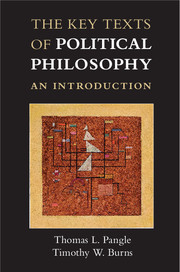Book contents
- Frontmatter
- Dedication
- Contents
- Acknowledgments
- Introduction
- Part I Classical Political Philosophy
- 1 Plato’s Apology of Socrates
- 2 Plato’s Republic, Book One
- 3 Aristotle’s Politics
- Part II Biblical Political Theology
- Part III Modern Political Philosophy
- Part IV Modernity in Question
- Name Index
- Subject Index
2 - Plato’s Republic, Book One
Published online by Cambridge University Press: 05 October 2014
- Frontmatter
- Dedication
- Contents
- Acknowledgments
- Introduction
- Part I Classical Political Philosophy
- 1 Plato’s Apology of Socrates
- 2 Plato’s Republic, Book One
- 3 Aristotle’s Politics
- Part II Biblical Political Theology
- Part III Modern Political Philosophy
- Part IV Modernity in Question
- Name Index
- Subject Index
Summary
Plato’s longest and most famous Socratic dialogue consists in an uninterrupted narration by Socrates, to persons unidentified, of remarkable events and conversation that took place the previous night. Socrates begins by relating that he and a companion named Glaucon “went down, yesterday, to the Piraeus” – and it is there, in the port of Athens, that the entire subsequent dialogue is set, mostly inside the home of a resident alien named Cephalus. No other Platonic work is placed in this setting, with its specific atmosphere. The port is situated eight miles from the city of Athens and is a site appropriate for discussion involving radical civic and religious thought experimentation. Like most busy ports, it is rife with foreigners and alien ways, and even strange new gods. Indeed, this last is what Socrates says drew him there: He went to “pray to, and out of a wish to observe the festival of,” a goddess whose festival was being introduced “for the first time.” Socrates’ piety comes to sight as attracted by “novel divinities” (recall the formal criminal charges lodged against him: Apology 24b–c).
Having prayed and observed, the pair headed back to the city: Socrates makes it clear that they did not intend to visit old Cephalus and his family. But they were compelled to wait, first by the command and hand of a slave, sent by Polemarchus, the son of Cephalus, and then by a jovial little gang led by Polemarchus. At the start of the Platonic dialogue on justice and the best regime we are lightheartedly reminded of the austere truth that society is controlled chiefly by force (including enslavement), and by the strength of numbers, especially the numbers of the younger males.
- Type
- Chapter
- Information
- The Key Texts of Political PhilosophyAn Introduction, pp. 36 - 66Publisher: Cambridge University PressPrint publication year: 2014



